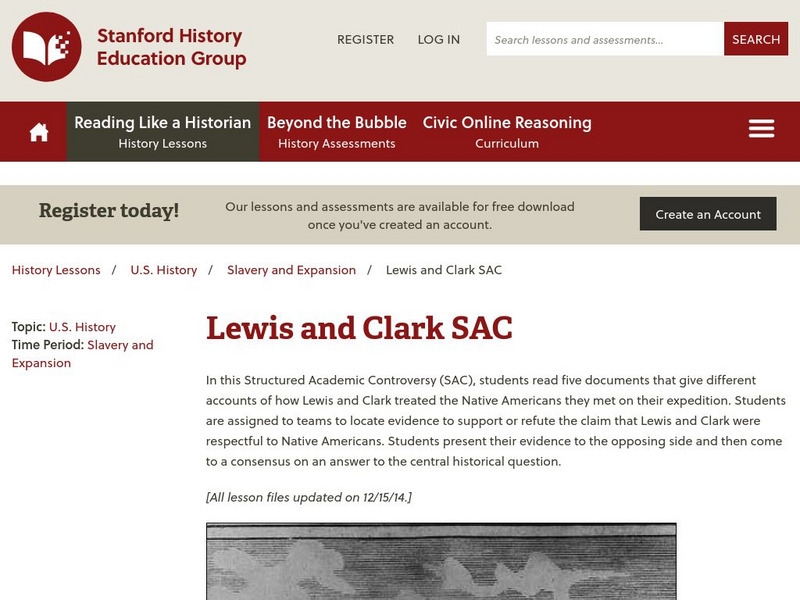Curated OER
The Information Revolution: A Hypothetical Case
Students consider the implications of the information revolution. In this information age instructional activity, students discuss informatics and the misuse of information. Students form a fictional bureau of information control and...
Curated OER
"The Fog Horn" by Ray Bradbury
Learners read Ray Bradbury's "The Fog Horn" and complete reading and vocabulary activities. In this reading and vocabulary lesson, students review the vocabulary for the story and take turns reading the story. Learners discuss the story...
Curated OER
Why is Delaware Called "The First State"?
Learners learn why Delaware is called the First State and the background leading to Delaware's ratification of the US Constitution. Students, in groups, choose an individual in today's world that has the greatest influence on their...
Curated OER
Lesson I - Why is Delaware Called "The First State"?
Students discuss why Delaware is called the First State, research background leading to Delaware's ratification of United States Constitution, complete worksheet on United States Constitution, and work in groups to choose an individual...
Curated OER
The 1812 Louisiana Constitution
Students analyze the Louisiana Constitution of 1812 and then draw up a constitution for their particular school. They compare the Louisiana Constitution to the United States Constitution of 1789 and create a graphic organizer of both...
Curated OER
Salmon Run
High schoolers examine the life cycle of the Pacific salmon and the impact of humans on salmon migration. They watch a Powerpoint presentation, trace migration routes on satellite imagery, and complete mock calculations of salmon energy...
Curated OER
Where in the World War? Mapping WWII in the Pacific
Students study the geography of the Pacific theater of World War II. They study maps to examine the geography and features of the land.
Curated OER
Immigration in the Connecticut River Valley
Young scholars discuss and compare immigration during the 18th century to the Connecticut River Valley to that in America during the turn of the century.
Curated OER
WRITING THE WIND
The student will compose sentences using adjectives that describe windmills.Review adjectives. Write a noun on the board and have students name the appropriate adjectives. 2. Hand out worksheets and review directions for making windmill...
Curated OER
A TOUGH NUT TO CRACK
Based on a set of criteria, young scholars will evaluate the quality of pecans.1. Bring a gram scale and papershell pecans. Provide five pecans for each student. 2. Divide the class into groups of five and provide each member with five...
Curated OER
The Work of an Historian
Students examine the life of John Pynchon and his role in the Connecticut River Valley's development.
Curated OER
A Dream and an Idea: Searching for a Roadmap to Create a Country
Students compare and contrast opposing visions of government held by the founding fathers. They evaluate the roles of historical leaders in shaping the U.S. as an emerging nation.
Curated OER
South Carolina's Constitution
Eighth graders explore the definition of political culture. After viewing a movie, 8th graders discuss how the political culture of the 1600 and 1700s is reflected in early drafts of the South Carolina constitution.
Curated OER
Web Wilderness
Fourth graders write an expository paper using notes taken during a field trip or a guest speaker.
Curated OER
Foreign Travel
Eighth graders visit the website of the U.S. embassy of a different country, and gather information that would be important for them to know if they were going to travel there.
Stanford University
Sheg: Document Based History: Reading Like a Historian: Lewis and Clark
[Free Registration/Login Required] In this Structured Academic Controversy (SAC), students read four documents that give different accounts of how Lewis and Clark treated the Native Americans they met on their expedition. Students are...
Stanford University
Sheg: Document Based History: Reading Like a Historian: Spanish American War
[Free Registration/Login Required] Learners use primary source documents to investigate central historical questions. In this investigation students study the Spanish-American War by watching a documentary video, reading a telegram...
Stanford University
Sheg: Document Based History: Reading Like a Historian: Manifest Destiny
[Free Registration/Login Required] Students use primary source documents to investigate central historical questions. In this investigation students use nineteenth-century maps and art, and consider the roots of American exceptionalism.
Stanford University
Sheg: Document Based History: Reading Like a Historian: Reconstruction Sac
[Free Registration/Login Required] Students use primary source documents to investigate central historical questions. In this structured academic controversy, students examine constitutional amendments, a Black Code, a personal account...
Stanford University
Sheg: Document Based History: Reading Like a Historian:examining Passenger Lists
[Free Registration/Login Required] Students use primary source documents to investigate central historical questions. In this investigation, students critically examine the passenger lists of ships headed to New England and Virginia to...
Library of Congress
Loc: Migration During the Great Depression: Living History
Most people in Central Florida came from somewhere else. Students first analyze life histories from American Life Histories: Manuscripts from the Federal Writers' Project, 1936-1940 to learn oral history techniques. They then interview...
Library of Congress
Loc: Teachers: The Immigrant Experience: Down the Rabbit Hole
Through a series of six activities, students read about, connect to, and draw conclusions about the immigrant experience, via personal experience and a collection of resources, including Lewis Carroll's "Alice in Wonderland," oral...





















